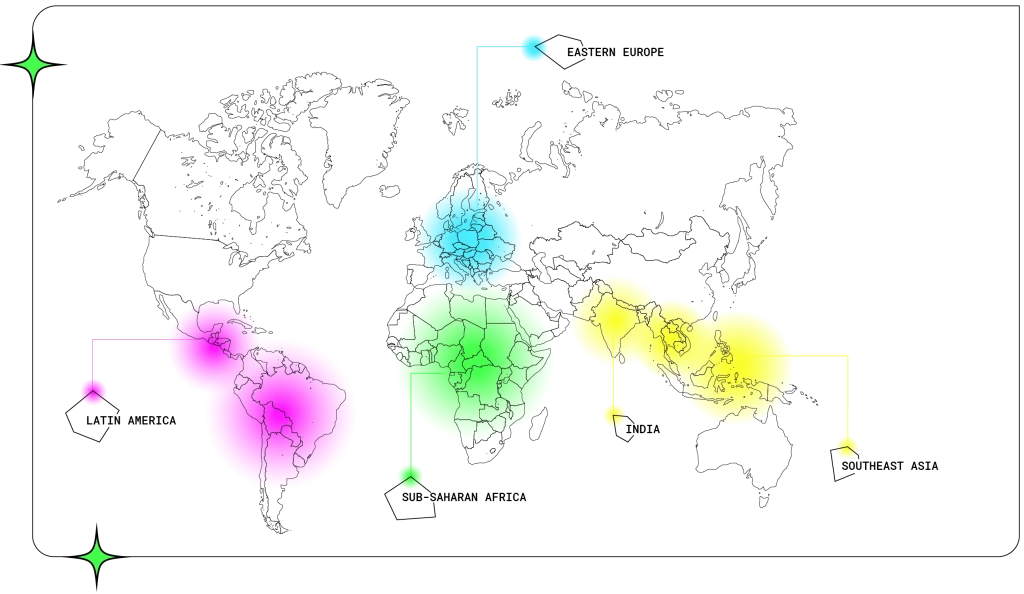WE ARE A COMMUNITY OF PRACTICE THAT PROMOTES DELIBERATIVE DEMOCRACY
IN THE GLOBAL SOUTH.
COMMUNITIES
OF PRACTICES
This can happen in Lagos, Rosario, Bratislava, and other cities in the Global South.
Women, young people, community leaders, and concerned citizens talk face to face with public officials and make decisions to transform their community. This isn't a casual meeting: it's the result of a global network. It's a community that has crossed borders. —activists sharing methodologies, researchers documenting learning, practitioners adapting tools, institutions opening up to new forms of participation— who work to make this type of meeting possible.
- Demo.Reset
- Demo.Reset
- Demo.Reset
- Demo.Reset
- Demo.Reset
- Demo.Reset
- Demo.Reset
- Demo.Reset
- Demo.Reset
- Demo.Reset
- Demo.Reset
- Demo.Reset
WE ARE THAT NETWORK!
A community of organizations, practitioners, scholars, and activists advancing deliberative democracy in the Global South.
Strengthen citizen-led participatory processes that enable citizens to make decisions together with public institutions
Participatory methods
Knowledge management
Tool adaptation
LOCAL
WITH GLOBAL STRENGTH

Each process we support originates from a specific territory and is rooted in its history, tensions, forms of care, and participatory actions. There is no deliberative democracy without the everyday: without the conversations on the sidewalk, without the networks of trust between neighbors, without the memory of past community organization
SOMETHING HAPPENS
We are generating a larger conversation together. We share methodologies in different languages, adapt tools to other cultures, learn from the challenges of other communities and find inspiration in good practices. Each citizen council, assembly, laboratory, and gathering between citizens and public officials is unique. But behind each one, there is the same pulse: the conviction that democracy is nurtured and reinvented from the collective, among many visions and diverse knowledge.

A LABORATORY
DEMOCRATIC INNOVATION
We work with organizations in Africa, Latin America, and Asia, connecting communities and self-managed processes that are transforming their territories.
- We accompany social organizations.
- We evaluate impact
- We build shared learning.
WE RESTART DEMOCRACY
FROM COLLECTIVE EXPERIENCE
If you want to get involved, share tools and stories from your community of practice, or understand how deliberative democracy works in your region and others in the Global South.
THIS HAPPENS WHEN
DELIBERATIVE DEMOCRACY PRACTICES
ARE STRENGTHENED
- SUB-SAHARAN AFRICA
- Legislative Theater
- Youth
- Residences
- Citizen empowerment
“I LEARNED TO BE CONCISE AND ELOQUENT IN PUBLIC SPEAKING.”
In Nigeria, young people create legislative plays and change local policies.
- EASTERN EUROPE
- DemTech
- Civil society
- Accompaniment model
- Strengthening democracy
“OUR MISSION IS TO IMPROVE LIVES THROUGH INNOVATION.”
In Slovakia, participatory processes succeed in curbing institutional distrust.
- LATIN AMERICA
- Citizen dialogues
- Youth
- Residences
- Civic capacities
“WE KIDS CAN PARTICIPATE AND CONTRIBUTE TO OUR NEIGHBORHOOD.”
In Argentina, young people create proposals with the municipality to transform the public square.
FREQUENTLY ASKED QUESTIONS
Do I need prior experience in deliberative democracy to participate?
No. We value diverse backgrounds. Most of our calls are aimed at individuals or organizations who are getting familiar with citizen participation and deliberative democracy, and who want to improve their processes. In addition, we offer virtual events open to all audiences interested in learning and contributing innovative solutions. We prioritize collective learning and peer collaboration.
What if I’m not from the Global South? Can I still participate?
Yes. While most of our calls focus on strengthening initiatives in the Global South, we also promote cross-regional learning. You can join open events, exchanges, and activities that value interregional dialogue.
How can I stay informed about new calls or events?
We recommend subscribing to our newsletter, joining our WhatsApp groups, and following us on social media. You can also fill out our registration form to receive updates about the project.
Can I propose an initiative, resource, or activity to be part of Demo.Reset?
Yes. We’re always open to new collaborations. If you have an experience or project you’d like to share, you can write to us directly at demoreset@extituto.org. We review proposals on a rolling basis.
